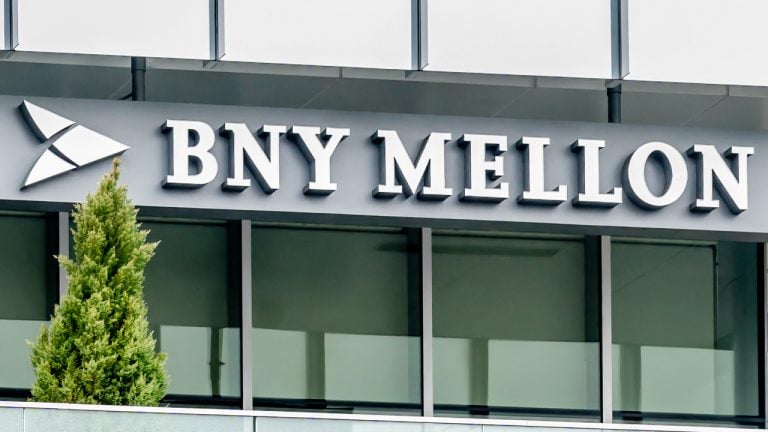
An executive of Bank of New York Mellon reportedly thinks that crypto assets are for the long haul based on a study that the bank commissioned last year. According to Reuters, BNY Mellon’s head of advanced solutions Michael Demissie says that the study conducted in October 2022 indicates that digital assets are here to stay. […]
The post BNY Mellon Executive Says Crypto Assets Are ‘Here To Stay,’ With High Level of Investor Interest: Report appeared first on The Daily Hodl.
 The online marketplace giant, Ebay, is seeking to fill several positions in the area of Web3 and non-fungible token (NFT) technology, according to several Linkedin job postings. Ebay is looking for a “creative crypto attorney” for the marketplace, Knownorigin, which it acquired in June 2022. Big Corporations Still Seek Workers to Manage Crypto and Blockchain […]
The online marketplace giant, Ebay, is seeking to fill several positions in the area of Web3 and non-fungible token (NFT) technology, according to several Linkedin job postings. Ebay is looking for a “creative crypto attorney” for the marketplace, Knownorigin, which it acquired in June 2022. Big Corporations Still Seek Workers to Manage Crypto and Blockchain […] Nine major financial institutions and the Federal Reserve Bank of New York have started to experiment with a digital dollar proof of concept to see if distributed ledger technology can improve settlement between central banks, commercial banks, and regulated non-banks. The New York Fed details that the proof of concept will be done in a […]
Nine major financial institutions and the Federal Reserve Bank of New York have started to experiment with a digital dollar proof of concept to see if distributed ledger technology can improve settlement between central banks, commercial banks, and regulated non-banks. The New York Fed details that the proof of concept will be done in a […]
Traditional financial institutions continue to demonstrate use cases for digital asset support, along with DeFi capabilities, despite current market conditions.
The cryptocurrency sector is the Wild Wild West in comparison to traditional finance, yet a number of banks are showing interest in digital assets and decentralized finance (DeFi). This year in particular has been notable for banks exploring digital assets.
Most recently, JPMorgan demonstrated how DeFi can be used to improve cross-border transactions. This came shortly after BNY Mellon — America’s oldest bank — announced the launch of its Digital Asset Custody Platform, which allows select institutional clients to hold and transfer Bitcoin (BTC) and Ether (ETH).
The Clearing House, a United States banking association and payments company, stated on Nov. 3 that banks “should be no less able to engage in digital-asset-related activities than nonbanks.”
While banks continue to show interest in digital assets, BNY Mellon’s 2022 Survey of Global Institutional Clients highlights increasing demand from institutions seeking access to digital assets through reputable custodians. According to the survey, almost all of the 271 institutional investors (91%) are interested in investing in tokenized assets. The survey also found that most of these investors are using more than one custodian, with 35% conducting business with traditional incumbent players.
The heightened demand from institutions seeking access to digital assets is one of the reasons why banks are showing interest in cryptocurrency and DeFi offerings.
Bobby Zagotta, CEO of Bitstamp USA — a cryptocurrency exchange founded in 2011 — told Cointelegraph that Bitstamp has received many inbound requests recently for their Bitstamp-as-a-Service offering, which allows fintechs and traditional financial institutions to give clients access to cryptocurrency.
“Last year, fintechs were asking Bitstamp about services to support cryptocurrency. This year, fintechs have been discussing the downsides of not offering clients access to digital assets. Banks are waking up to the fact that there is client demand to buy and sell crypto, and if people can’t do this with their banks they will go somewhere else,” he said.
Zagotta added that banks currently not looking to implement digital asset offerings will lose market share: “Banks are realizing that they could be creating a customer retention problem if they don’t come to market with crypto offerings.”
To Zagotta’s point, BNY Mellon’s survey found that 65% of institutions are currently engaging with digital-native platforms rather than traditional financial players. However, BNY Mellon’s findings also indicate that 63% of surveyors would accept longer settlement times in order to transact with a highly rated traditional institution.
Recent: Breaking down FTX’s bankruptcy: How it differs from other Chapter 11 cases
Moreover, some industry experts believe that large banks can advance their operations by implementing crypto and DeFi solutions. Colin Butler, global head of institutional capital at Ethereum layer-2 network Polygon, told Cointelegraph that while the pilot trade conducted by JPMorgan and the Monetary Authority of Singapore was a milestone toward the adoption of decentralized solutions, it also demonstrates that these entities are testing to see if DeFi frameworks are beneficial.
“If the answer is ‘yes,’ then it would allow them to significantly increase the efficiency of their operations,” he said.
Butler elaborated that Polygon’s proof-of-stake blockchain ensured that the cross-border transaction conducted between JPMorgan, the Monetary Authority of Singapore, and other banking entities was fast, secure, and as cost-efficient as possible. He said:
“All of these elements are extremely important when it comes to DeFi adoption. The inherent efficiency of blockchain-based solutions is what gives DeFi an advantage over traditional financial systems that have been built over the past decades. While they’re still ‘working,’ these frameworks are very rigid. The latest advancements in DeFi can help make the whole process of transacting significantly more efficient and convenient.”
Echoing Butler, Seamus Donoghue, chief growth officer at METACO — a digital asset custody provider for major financial institutions — told Cointelegraph that he believes all financial assets will eventually be represented on distributed ledgers. As such, Donoghue mentioned that there is an imperative to redesign the financial market infrastructure.
“This is the reason why virtually all tier-1 banks are now investing in building new infrastructure: not for the currently bearish crypto market, but for the much larger vision of how every asset will be represented and how value will be created and exchanged, globally,” he said.
Donoghue added that banks will eventually become the bridge for institutions seeking exposure to digital assets and DeFi. He explained that this is due to the fact that traditional financial institutions have consumer trust, large balance sheets and a network of market participants creating liquidity, along with a customer base with unmet needs.
However, traditional financial institutions remain concerned about regulations. Mathias Schütz, head of client and tech solutions at SEBA Bank — a Swiss-based digital asset bank — told Cointelegraph that traditional banks are hesitant to engage with digital assets due to regulatory uncertainty.
In order to solve this, Schütz noted that SEBA Bank, which is licensed by Swiss regulators, acts as a trusted counterparty for institutions to engage with digital assets.
“This is why SEBA Bank has been able to partner with a number of major banks in 2022, including LGT Bank, the world’s largest family-owned private bank,” he said. This is also important from a consumer’s perspective, as findings from BNY Mellon’s survey notes that investors are primarily concerned with digital custodians’ legal and regulatory frameworks.

Regulations aside, the recent turn of events with FTX US and Binance may impact how traditional financial institutions view digital assets. While it’s too soon to understand the consequences of this debacle, Donoghue mentioned that the FTX US and Binance shakeup could have a short-term impact. “It could shift banks’ strategies to skip cryptocurrency services, and focus exclusively on digital securities more broadly, at least temporarily,” he said.
Eric Berman, a regulatory expert at Thomson Reuters, told Cointelegraph that he doesn’t believe this event will hasten bank involvement in digital assets. “Banking institutions have taken it slow with crypto as it is. The FTX US and Binance situation probably underscores to the banking sector that it has done the right thing in taking a pragmatic approach.”
In any case, both Donoghue and Berman are aware that this event demonstrates the need for further regulatory clarity before traditional financial institutions can innovate with digital assets.
“The recent negative industry events have emphasized the critical need for safe and compliant infrastructure, business practices and regulatory oversight. So if anything, the demand for asset servicing from trusted institutions such as regulated global banks, has only increased,” Donoghue said.
It’s also interesting to point out that BNY Mellon’s survey examined how the Terra ecosystem collapse has impacted institutional investors. According to the report, 9% of institutional asset managers noted that the Terra collapse has not impacted their digital asset plans, while 50% reported taking a short-term pause to reassess, noting they will likely continue soon.
Recent: Could Hong Kong really become China’s proxy in crypto?
Regarding whether the bear market will impact banks’ interest in digital assets, Butler explained that the crypto market is not much of a factor affecting banks, particularly when it comes to DeFi. For instance, he pointed out that JPMorgan used Polygon to conduct a live cross-currency transaction that involved tokenized Singapore dollar and Japanese yen deposits, along with a simulation of tokenized government bonds. According to Butler, those assets have no correlation with crypto prices. He added:
“Essentially, financial institutions are looking for ways to tokenize traditional assets — and this could be anything, from bonds and fiat currencies to real estate deeds — and transact them digitally. As such, these tokens retain the value of their ‘original’ assets, so this is more about the technology itself rather than crypto prices and bear/bull markets.”

A survey commissioned by the Bank of New York Mellon (BNY Mellon) is showing that tokenized products are highly popular among institutional investors. The survey, which polled 271 institutional investors, says that over 90% of the respondents would be interested in putting their money into tokenized products. “91% of respondents expressed interest in investing in […]
The post Nearly 100% of Institutional Investors Say One Crypto Use Case Will Revolutionize Asset Management: BNY Mellon appeared first on The Daily Hodl.

The CEO of Bank of New York Mellon Corporation (BNY Mellon) says that America’s oldest bank is launching Bitcoin (BTC) and crypto custody services in response to rising demand from clients. Last week, BNY Mellon became the first major US bank to provide customers with a custody platform for both cryptocurrency and traditional assets after […]
The post Bank of New York Mellon CEO Says Recent Entry Into Bitcoin and Crypto Services Driven by Client Demand appeared first on The Daily Hodl.

Another major financial institution has signaled its intent to offer Bitcoin and Ether services to its clients.
As crypto traders debate whether Bitcoin (BTC) is going to $25,000 or $15,000 first, the world’s largest financial institutions are laying the groundwork for mass adoption. The proverbial floodgates are unlikely to open before the United States provides a clear regulatory framework for crypto, but regulators and industry insiders are confident that guidance could come in 2023 at the earliest. In the meantime, megabanks like BNY Mellon, whose roots date back to 1784, are entering the space.
This week’s Crypto Biz chronicles BNY Mellon’s foray into digital assets, JPMorgan’s ongoing experimentation with blockchain technology and Crypto.com’s new European headquarters.
Arguably the biggest story of the week was news of another established financial institution entering the crypto sphere. BNY Mellon, whose predecessor was founded 238 years ago, announced the launch of a digital custody platform to safeguard clients’ Bitcoin and Ether (ETH) holdings. “With Digital Asset Custody, we continue our journey of trust and innovation into the evolving digital assets space while embracing leading technology and collaborating with fintechs,” said Roman Regelman, the bank’s CEO of securities services and digital. To get a sense of just how massive BNY Mellon is, the bank holds over $470 billion in assets under custody as of 2021.
JPMorgan continues to experiment with blockchain technology and digital assets even after its CEO attempted to dismiss the sector as a Ponzi scheme. Now, the U.S. financial institution is partnering with Visa to streamline the use of its private blockchain for cross-border payments. The partnership centers around JPMorgan’s Liink blockchain, which has been designed specifically for cross-border transfers, and Visa’s B2B connect, a cross-border payment network for banks. As Cointelegraph reported, it seems like the duo wants to develop an alternative to SWIFT, the dominant global network for secure messaging and transactions.
2021 was the year of sponsorships for Crypto.com. Now, 2022 is shaping up to be the year of regulatory approvals. In light of regulatory traction in Europe, the crypto exchange announced this week that Paris, France, would become its new European headquarters. The company plans to spend roughly $145.7 million to establish its presence in France. Additional resources will be allocated to boosting the exchange’s presence across the region. It looks like Crypto.com is positioning itself for the next bull market. Most of its casual retail users probably won’t open the app until then.
Bonjour Paris
— Crypto.com (@cryptocom) October 12, 2022
We’re excited to deepen our commitment and presence in France, by making Paris our new European regional HQ
Full details:https://t.co/nBoixpyMHi pic.twitter.com/EhkbKYUOZQ
Stellar doesn’t get nearly as much airtime as it did during the 2017 crypto bubble, but the network is still working to spur adoption and innovation on its Soroban smart contract platform. This week, Stellar Development Foundation (SDF), the nonprofit organization supporting the development of the Stellar network, announced it had launched a $100 million fund to incentivize developers to build on Soroban. Timer Weller, SDF’s vice president of technology strategy, told Cointelegraph that Soroban was developed to overcome the “friction” of existing blockchain networks.
Bitcoin’s price action is starting to look eerily similar to 2018’s “range from hell.” And we all know what happened after that (BTC would eventually plunge from $6,000 to roughly $3,200, marking the final bottom for the cycle). In this week’s Market Report, I sat down with Benton Yaun to discuss BTC’s price trajectory and how the latest CPI inflation data could impact the market. You can watch the full replay below.
Crypto Biz is your weekly pulse of the business behind blockchain and crypto delivered directly to your inbox every Thursday.

US banking giant Bank of New York Mellon Corporation (BNY Mellon) is set to offer Bitcoin (BTC) and other crypto custody services. Earlier this year, BNY Mellon CFO Emily Portney stressed the importance of mainstream financial institutions obtaining clear definitions of what is permitted by the U.S. Securities and Exchange Commission (SEC) before offering crypto investment services […]
The post $43,000,000,000,000 Financial Giant BNY Mellon To Offer Bitcoin (BTC) Services to Wealthy Clients: Report appeared first on The Daily Hodl.
 America’s oldest bank, the Bank of New York Mellon Corporation, commonly known as BNY Mellon, has announced the financial institution can now custody cryptocurrencies. A report published by the Wall Street Journal on Tuesday, says BNY Mellon was approved by the New York State Department of Financial Services (DFS), and the bank said it was […]
America’s oldest bank, the Bank of New York Mellon Corporation, commonly known as BNY Mellon, has announced the financial institution can now custody cryptocurrencies. A report published by the Wall Street Journal on Tuesday, says BNY Mellon was approved by the New York State Department of Financial Services (DFS), and the bank said it was […]
The bank will store private keys and provide bookkeeping services equivalent to those offered to fund managers in traditional assets.
BNY Mellon launched a digital custody platform to safeguard select clients' Ether (ETH) and Bitcoin (BTC) holdings on Oct. 11, making America's oldest bank the first large bank in the country to offer the custody of digital assets and traditional investments on the same platform.
According to a statement, the bank will store private keys to access the funds and provide the same bookkeeping services offered to fund managers in other assets, such as stocks and bonds.
"With Digital Asset Custody, we continue our journey of trust and innovation into the evolving digital assets space, while embracing leading technology and collaborating with fintechs," said Roman Regelman, CEO of Securities Services & Digital at BNY Mellon.
BNY Mellon is 238 years old, possesses over $43.0 trillion in assets under custody or administration worldwide, and in 2021, formed an enterprise Digital Assets Unit to develop digital assets solutions and a platform to bridge digital and traditional asset custody. The bank wasgranted approval for crypto custody earlier this fall from the New York financial's authority.
Related: BNY Mellon plans to launch digital asset custody platform later this year
A recent survey from the bank revealed that 91% of institutional investors are interested in investing in tokenized products, and 41% of them hold cryptocurrency in their portfolios.
In March, the bank was selected by Circle as the custodian of its USD Coin reserves. BNY previously announced its partnership with blockchain-data platform Chainalysis to help traditional financial institutions track and analyze cryptocurrency products, allowing large firms to manage legal risks related to cryptocurrencies.